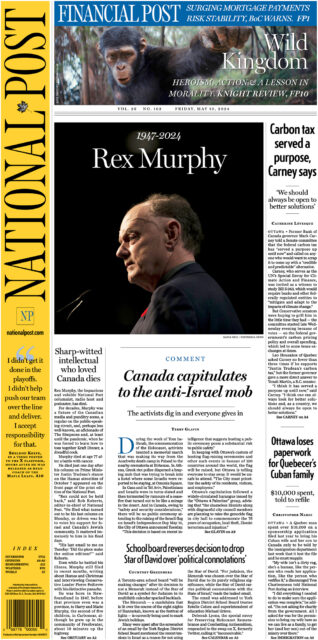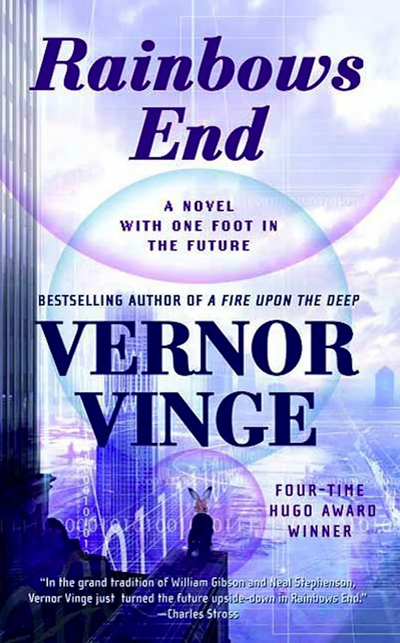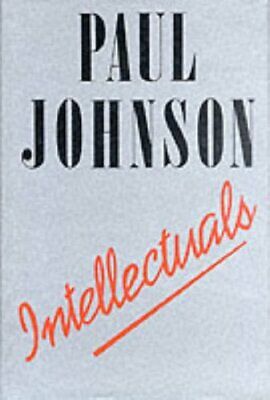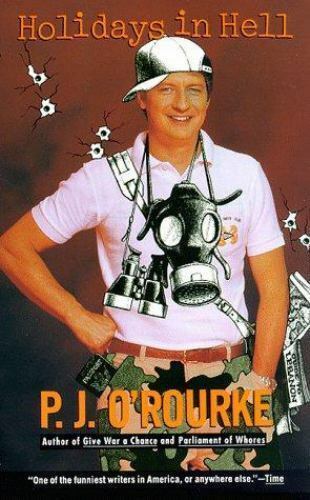ReasonTV
Published 29 Dec 2024Nobel-Winning Economist Vernon Smith says the 39th president radically improved air travel, freight rail, and trucking in ways that still benefit us immensely.
______Jimmy Carter was perhaps the most successful ex-president in American history, winning the Nobel Peace Prize in 2002 for his work promoting human rights and economic and social development.
But his single term as president (1977–1981) is largely remembered as a series of failures and missteps, sometimes literally. Gas lines, a record-high combination of unemployment and inflation on the “misery index”, and Americans being held hostage by Iranian revolutionaries for over a year all fueled the perception that Carter was a weak and ineffective leader. When he collapsed during a six-mile run, it personified for many the exhaustion of the country under his leadership.
But there was at least one way in which Carter excelled as president. He was, in the words of 2002 Nobel–winning economist Vernon Smith, the great deregulator. Carter forced the airline industry, along with interstate trucking and freight rail, to compete for business, with powerful and positive effects that continue to this day.
I talked to Smith about Carter, whom he met at a White House event for American Nobel Prize winners, and what it was like to fly in the days when the government controlled air travel.
December 30, 2024
RIP Jimmy Carter, “The Great Deregulator”, 1924-2024
May 11, 2024
Rex Murphy, RIP
Canadian political commentator Rex Murphy has died at 77:
Tributes and remembrances from across the political spectrum have poured in for Rex Murphy, who died aged 77.
Mark Critch, a fellow Newfoundlander who parodied Murphy on the CBC program This Hour Has 22 Minutes, recalled that Murphy had worked with his father at VOCM radio in St. John’s, N.L. “You might not always agree with what he had to say but oh, could he say it”, Critch wrote on X, formerly Twitter. “I hope he makes it home to Gooseberry Cove.”
That theme — of not always agreeing with Murphy, but admiring his style — has been frequent in remembrances of his life.
Bob Rae, a long-time Liberal member of Parliament, former premier of Ontario and now Canada’s ambassador to the United Nations, wrote of meeting Murphy on television in 1978: “He stole the show”.
“We disagreed about many things, but I never lost my affection and admiration for him,” Rae wrote on X.
In a video posted Thursday evening, which had been recorded for an award Murphy received prior to his death, Conservative Leader Pierre Poilievre praised Murphy’s “verbal ninja moves”.
“You are a national treasure. You are a voice of reason. You are a champion of all things that are great in our country,” Poilievre said.
Canada has lost an icon, a pioneer of independent, eloquent, and fearless thought, and always a captivating orator who never lost his touch.I was honoured to toast to Rex a few months ago on receiving the Game Changers Award for one of this country’s true game changers.
Rex,… pic.twitter.com/Nz8fWBPv7F
— Pierre Poilievre (@PierrePoilievre) May 10, 2024
On Friday, the House of Commons held a moment of silence in honour of Murphy.
“Few gifts from the rock rival that of the now-departed Rex Murphy,” Conservative MP John Williamson said in the House. “Rex stood on guard for all of us with great wit and wisdom throughout his many newspaper columns and on-air commentaries. Rex was brave but without pretence. He despised the smug.”
Murphy’s writing, which appeared for more than a decade in National Post, was always fierce, often controversial, and liberally peppered with the sort of language that has the feel of an age gone by.
March 25, 2024
Vernor Vinge, RIP
Glenn Reynolds remember science fiction author Vernor Vinge, who died last week aged 79, reportedly from complications of Parkinson’s Disease:
Vernor Vinge has died, but even in his absence, the rest of us are living in his world. In particular, we’re living in a world that looks increasingly like the 2025 of his 2007 novel Rainbows End. For better or for worse.
[…]
Vinge is best known for coining the now-commonplace term “the singularity” to describe the epochal technological change that we’re in the middle of now. The thing about a singularity is that it’s not just a change in degree, but a change in kind. As he explained it, if you traveled back in time to explain modern technology to, say, Mark Twain – a technophile of the late 19th Century – he would have been able to basically understand it. He might have doubted some of what you told him, and he might have had trouble grasping the significance of some of it, but basically, he would have understood the outlines.
But a post-singularity world would be as incomprehensible to us as our modern world is to a flatworm. When you have artificial intelligence (and/or augmented human intelligence, which at some point may merge) of sufficient power, it’s not just smarter than contemporary humans. It’s smart to a degree, and in ways, that contemporary humans simply can’t get their minds around.
I said that we’re living in Vinge’s world even without him, and Rainbows End is the illustration. Rainbows End is set in 2025, a time when technology is developing increasingly fast, and the first glimmers of artificial intelligence are beginning to appear – some not so obviously.
Well, that’s where we are. The book opens with the spread of a new epidemic being first noticed not by officials but by hobbyists who aggregate and analyze publicly available data. We, of course, have just come off a pandemic in which hobbyists and amateurs have in many respects outperformed public health officialdom (which sadly turns out to have been a genuinely low bar to clear). Likewise, today we see people using networks of iPhones (with their built in accelerometers) to predict and observe earthquakes.
But the most troubling passage in Rainbows End is this one:
Every year, the civilized world grew and the reach of lawlessness and poverty shrank. Many people thought that the world was becoming a safer place … Nowadays Grand Terror technology was so cheap that cults and criminal gangs could acquire it. … In all innocence, the marvelous creativity of humankind continued to generate unintended consequences. There were a dozen research trends that could ultimately put world-killer weapons in the hands of anyone having a bad hair day.
Modern gene-editing techniques make it increasingly easy to create deadly pathogens, and that’s just one of the places where distributed technology is moving us toward this prediction.
But the big item in the book is the appearance of artificial intelligence, and how that appearance is not as obvious or clear as you might have thought it would be in 2005. That’s kind of where we are now. Large Language Models can certainly seem intelligent, and are increasingly good enough to pass a Turing Test with naïve readers, though those who have read a lot of Chat GPT’s output learn to spot it pretty well. (Expect that to change soon, though).
March 4, 2024
“Whatever his flaws, Brian Mulroney was a serious person”
In the free-to-cheapskates teaser from this week’s dispatch from The Line, nice words are said in memory of the late Brian Mulroney, former Prime Minister of Canada:
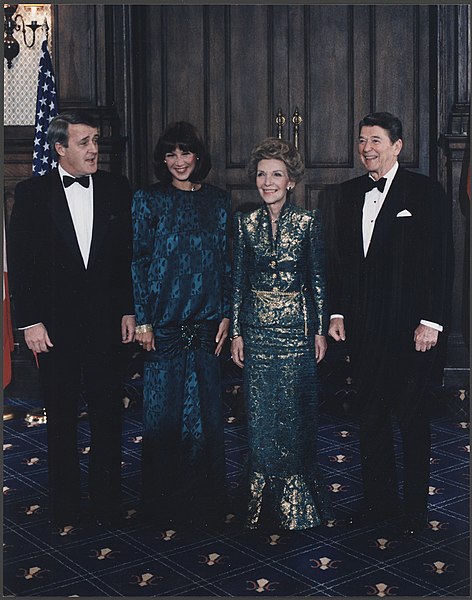
Prime Minister Brian Mulroney, Mila Mulroney, Nancy Reagan, and President Ronald Reagan at the “Shamrock Summit”, 18 March, 1985.
Photo from the Ronald Reagan Presidential Library via Wikimedia Commons.
Brian Mulroney died last week. He was 84.
The first thing you could be forgiven for taking away from the news coverage is how far we have fallen.
Brian Mulroney did big things. Negotiating Free Trade. Fighting Apartheid. Getting the Americans to crack down on acid rain. Comprehensive tax reform that saw the old Manufacturers’ Sales Tax (which taxed productivity) replaced with the GST. Sending Canadians to war in Desert Storm. Striking the Royal Commission on Aboriginal People which led to many of the legal advancements Indigenous communities were able to make through the 90s and into this century.
Even when he failed, as he did at Meech Lake, Brian Mulroney was trying to do something fundamentally transformative in Canadian politics.
And nobody who came after him had anywhere near that kind of guts. Not one of them.
There are things people will gripe about when it comes to Mulroney. Karlheinz Schreiber will be pretty close to the top of that list. Mulroney also tends to poll pretty poorly out west for any number of reasons ranging from a perceived over-emphasis on Quebec via Meech Lake and Charlottetown, to awarding the CF-18 maintenance contract to Montreal’s Canadair after (allegedly) promising it to Winnipeg-based Bristol Aerospace.
Mulroney was not beloved when he left office, to put it mildly. His party was basically annihilated in 1993, and the Canadian conservative movement shattered — it has still, in some ways, yet to fully recover. These are facts about which no one made more, or better, jokes than Mulroney himself. But that fall from esteem was almost never seen internationally. As he watched his contemporaries pre-decease him, Canadians got to see how respected the man was on the world stage. Mulroney was asked to eulogize American presidents Ronald Reagan and George H.W. Bush as well as British prime minister Margaret Thatcher. In this, Mulroney embodied one of the greatest cultural cynicisms of this country: sometimes, the only way for us to claim a Canadian as one of our own is to first watch them make it abroad.
Mulroney’s great triumph is free trade. Yes, because it meant jobs for millions of Canadians. Yes, because it locked us into an economic pact with the world’s powerhouse economy. But also because, in doing it, he went head-on at one of this country’s great cliches: the idea that reflexive, Laurentian, anti-Americanism was somehow a basis for governing instead of just the hallmark of a deeply insecure cultural elite.
Nobody is picking those fights now. Nobody is taking on the big battles to remake the country. We have been treated to almost 30 years of some of the pettiest, small-ball sniping imaginable. Various wedge issues are dusted off by either side, and hurled like stale buns at their opponents. Culture wars are imported for the purposes of giving our political class something about which they can feign moral outrage. Our leaders are afraid of big things either because they’re hard, or because they are unlikely to pay off in a single four-year election cycle. Mulroney is, arguably, the last Canadian prime minister whose vision of what Canada is, or could be, was not limited by a four-year horizon.
We are a serious country that is not led by serious people. And that is brought into focus when you lose a serious person.
Whatever his flaws, Brian Mulroney was a serious person.
The Line‘s editors say that Mulroney wasn’t well liked on leaving office, but the utter obliteration of the Progressive Conservatives in the 1993 federal election can’t be completely blamed on him. His successor as PC leader, Kim Campbell, went out of her way to alienate western conservatives and libertarians during her brief time in office and during the election campaign that followed. She became Prime Minister with a surprising level of tentative support that she jettisoned in record time, taking her party from a majority in the House of Commons to two (2) seats — only one other Canadian PM has ever been defeated in their own riding (Arthur Meighen … but he had it happen twice, first in 1921 and again in 1926).
March 2, 2024
Brian Mulroney, RIP
In a guest post at Paul Wells’ Substack, Ian Brodie describes former Prime Minister Brian Mulroney’s role in ending the Cold War:

Prime Minister Brian Mulroney, Mila Mulroney, Nancy Reagan, and President Ronald Reagan at the “Shamrock Summit”, 18 March, 1985.
Photo from the Ronald Reagan Presidential Library via Wikimedia Commons.
Mulroney’s role has long been poo-poohed by intellectuals on the Canadian left. He was said to have an unhealthy obsession with pleasing the Americans. As a young boy, his fine voice won him an opportunity to entertain visiting American executives with a song. Amateur psychologists diagnosed a disturbing link between Mulroney’s having grown up in a company town, under the shadow of a US owned mill, and his reinvigoration of St. Laurent’s post-war grand strategy.
Mulroney never automatically fell in with US positions on the global issues of the day. His opposition to the apartheid regime in South Africa ran counter to the positions of both Reagan and Thatcher. But he drove the effort to link the American and Canadian economies through the free trade agreement. He backed our allies in the strategic competition with the Soviet bloc. And in helping to create the International Democratic Union, he helped put the west’s centre-right parties on the side of international political cooperation on the side of democracy, liberty, and the rule of law. The contrast with an earlier prime minister who could not bring himself to condemn the declaration of martial law in Poland a few years earlier was clear.
His personal relationships with a generation of American leaders gave substance to the transactional successes. As the Soviet Union came apart, he secured a spot for Canada as the first NATO country to recognize Ukraine’s independence and bolstered the independence movements of the Baltic republics. When Iraq tried to establish a precedent that, following the Cold War, large, powerful countries could invade their neighbours with impunity, Mulroney backed the US led coalition to liberate Kuwait with all the diplomatic and military power he had on hand.
And along the way, he so closely befriended both Reagan and the first Bush that he was given a privileged platform at two US state funerals, an honour never extended to a Canadian leader before and unlikely to be extended to one again soon.
Mulroney deserves to be remembered along with St. Laurent as Canada’s grand strategist of the 20th century. A trusted confidant of world leaders.
December 2, 2023
Shane MacGowan, RIP
I’ve been a long-time fan of the Pogues, and Shane MacGowan was the original lead singer for their first several albums. His lifestyle and undependability brought about a break with the rest of the band who continued on without him. I rather lost track of him soon after his next band, the Popes, had one okay album that showed MacGowan hadn’t shaken his demons. I still post his duet with the late Kirsty MacColl every Christmas. In The Pillar, Ed Condon remembers MacGowan:

Shane MacGowan performing in Japan on an unknown date.
Photo by Masao Nakagami via Wikimedia Commons.
Yesterday Shane MacGowan, lead singer of the Pogues, died at age 65.
He was, in every sense, a living legend of Irish music — so much so that many people, sincerely, expressed shock that he was actually still alive. [NR: Literally the words out of my mouth when Elizabeth told me he’d died.]
Most people, at least in this country, know him best for his fiercely melancholic Christmas ballad “Fairytale of New York”, though the Pogues albums Rum, Sodomy & the Lash and If I Should Fall from Grace with God firmly fixed MacGowan as the living conduit of a musical tradition all too often dismissed as a postcard anachronism, created to appeal to tourists.
There was nothing contrived, though, about MacGowan, who was the living embodiment of the distinctly Irish contradiction of “fierce melancholy.” An incredibly gifted writer and poet, he wrote, performed — and lived — with a kind of burning urgency that seemed at once self-consuming and yet in him, rather than from him.
It would be easy to dismiss the riotous drinker and singer, whose punk-inflected incarnation of Irish ballardry seemed stoked with some terrible ferocity, as just an eloquently wounded product of a now nearly vanished Irish society. But what marked him out, to me, was that he was driven by something from within, not without.
Born on Christmas Day in 1957 to Irish parents in England, he spent his early life back in Ireland, living in a family cottage in rural Tipperary, where the children slept three to a bed, there was no running water, and the family cooked on an open fire.
According to his parents, music and storytelling were the focus of their family life in those days.
“It was basic and beautiful,” he said of his childhood. “It was the end of an era that I just happened to catch. And I’m glad I caught it, you know?”
[…]
“All I ever had were happy times,” is how MacGowan described his childhood in Ireland.
This deep understanding and love for his own history and where he came from, which John Paul II also wrote about in Memory and Identity, suffused MacGowan’s music.
But even as he became a kind of living totem in his home country it was clear he loathed the spotlight, writhed during interviews, and fought, often unsuccessfully, to balance his natural reticence with the convulsive need to make his music.
It drove him to at times terrible self-destruction, but the defiance and desperation of his singing seemed always directed back within himself. And it was a great comfort to read his family’s announcement that he’d died with the last rites imparted.
He was a man for whom the words of Jim Harrison, another great poet, seemed to be written:
Some people hear their own inner voices with great clearness and they live by what they hear. Such people become crazy, or they become legend.
Rest in peace, Shane.
October 8, 2023
October 7, 2023
QotD: Saudi princes
I see that Prince Abdul-Rahman bin Abdulaziz al Saud died the other day. If you’re having trouble keeping track of your Saudi princes, well, I don’t blame you. Unlike the closely held princely titles of the House of Windsor, the House of Saud is somewhat promiscuous with the designation: there are (at the time of writing) over 10,000 Saudi “princes” running around the country — and, in fact, at this time of year, more likely running around Mayfair and the French Riviera, exhausting the poor old blondes from the escort agencies. I believe that’s Abdul-Rahman at right, although to be honest all Saudi princes look alike to me, except that some wear white and others look very fetching in gingham. As I once remarked to Sheikh Ghazi al-Ghosaibi, the late cabinet minister, he was the only Saudi I knew who wasn’t a prince.
Abdul-Rahman was a longtime Deputy Defense Minister, whose catering company, by happy coincidence, held the catering contract for the Defense Ministry. The first Saudi prince to be educated in the west, he was a bit of a cranky curmudgeon in later years, mainly because of changes to the Saudi succession that eliminated any possibility of him taking the throne. But he nevertheless held a privileged place as the son of Ibn Saud, the man who founded the “nation” and stapled his name to it. When I say “the son”, I mean a son: Ibn Saud had approximately 100 kids, the first born in 1900, the last over half-a-century later, in 1952, a few months before ol’ Poppa Saud traded in siring for expiring.
Abdul-Rahman’s mother was said to be Ibn Saud’s favorite among his 22 wives — or, at any rate, one of the favorites. Top Five certainly. She also had the highest status, because she bore him more boys — seven — than any other other missus. They’re known as the Sudairi Seven or, alternatively, the Magnificent Seven. She also gave him seven daughters. They’re known as the seven blackout curtains standing over in the corner. This splendidly fertile lady’s name was Hussa bint Ahmed, and she was Ibn Saud’s cousin once removed and then, if I’m counting correctly, his eighth wife. But she’s a bit like the Grover Cleveland of the House of Saud — in that he’s counted as the 22nd and 24th President of the United States, and she’s the eighth wife and also either the tenth or eleventh. He first married her when he was 38 and she was 13. But he divorced her and then remarried her. In between their marriages she was married to his brother, but Ibn Saud was a sentimental lad and never got over his child-bride-turned-sister-in-law, so he ordered his brother to divorce her.
Don’t worry, though: In the House of Saud, it’s happy endings all round. Two of their daughters wound up marrying two of the sons of another brother of Ibn Saud. The Saudi version of Genealogy.com must be a hoot: “Hey, thanks for the DNA sample. You’re 53.8 per cent first cousin, and 46.2 per cent uncle.”
Mark Steyn, “The Son of the Man who Put the Saud in Saudi Arabia: Prince Abdul-Rahman bin Abdulaziz al Saud, 1931-2017”, Steyn Online, 2017-07-18.
May 8, 2023
Gordon Lightfoot, RIP
Mark Steyn on perhaps the best-known song of the late Gordon Lightfoot:
In November 1975 Lightfoot chanced to be reading Newsweek‘s account of the sinking of a Great Lakes freighter in Canadian waters. He’s a slow and painstaking author, which is one reason he’s given up songwriting – because it takes too much time away from his grandkids. But that day forty-three years ago the story literally struck a chord, and he found himself scribbling away, very quickly:
The legend lives on From the Chippewa on down
Of the big lake they called Gitche Gumee
The lake, it is said Never gives up her dead
When the skies of November turn gloomy …“Gitche gumee” is Ojibwe for “great sea” – ie, Lake Superior – as you’ll know if you’ve read your Longfellow, which I’m not sure anyone does these days. Evidently Hiawatha was on the curriculum back east across Lake Huron in young Gordy’s Orillia schoolhouse. The Gitche Gumee reference may be why, when I first heard “The Wreck of the Edmund Fitzgerald”, I assumed its subject had sunk long before the song was written. In fact, it sank on November 10th 1975 — just a few days before Lightfoot wrote the number. When she’d launched in 1958, the Edmund Fitzgerald was the largest ship on the Great Lakes, and, when she passed through the Soo Locks between Lakes Superior and Huron, her size always drew a crowd and her captain was always happy to entertain them with a running commentary over the loudspeakers about her history and many voyages. For seventeen years she ferried taconite ore from Minnesota to the iron works of Detroit, Toledo and the other Great Lakes ports … until one November evening of severe winds and 35-feet waves […]
That said, human tragedy alone does not make for singable material. The last contact from the SS Edmund Fitzgerald was with another ship, the SS Arthur M Anderson. Yet “The Wreck of the Arthur M Anderson” would have been a far less evocative title. Arthur Marvin Anderson was on the board of US Steel, as Edmund Fitzgerald was on the board of Northwestern Mutual. But there is something pleasingly archaic about the latter name: in fact, as I think of it, I believe the last Edmund I met was one of Gordon Lightfoot’s fellow Canadian singers — the late operetta baritone Edmund Hockridge. Pair “Edmund” to “Fitzgerald”, and you have something redolent of Sir Walter Scott or Robert Louis Stevenson, of shipwrecks off Cornwall or the Hebrides. Perhaps that’s why “The Wreck of the Edmund Fitzgerald” either sounds like an old Scots-Irish folk tune or, alternatively, actually is one. For any IRA members reading this, Bobby Sands, the hunger striker who starved himself to death in a British gaol, wrote in his cell a song called “Back Home in Derry”, about Irish prison deportees en route to Australia and set to a tune remarkably like “The Wreck of the Edmund Fitzgerald”, which it seems unlikely he ever heard.
I see some musicologists claim the tune is in Dorian mode, although it sounds Mixolydian to me (like “The Wexford Carol”). Whichever it is, there is a perfect union between the emphatic melody, the crash of the waves, the antediluvian moniker of Northwestern Mutual’s chairman, and even the obvious filler phrases, so typical of ancient folk songs:
The lake, it is said
Never gives up her dead— which returns far more effectively in the final verse:
Superior, they said
Never gives up her dead— as if Gitchee Gumee is some vast ravening beast. Go back to Orillia, to Fourth Grade in 1947, and the parents listening to Mr and Mrs Lightfoot’s little boy sing “Too-Ra-Loo-Ra-Loo-Ral” as if a bit of synthetic shamrock from an old Tin Pan Alleyman were a genuine Irish lullaby from the mists of Emerald Isle antiquity. That’s the genius of “The Wreck of the Edmund Fitzgerald”: It was born sounding as if it’s a hundred years old. And its agelessness is all the more amazing when you consider that it’s essentially an act of journalism, an adaptation of a news report about something that happened a few days earlier – just the facts, ma’am, with minimal artistic license:
In a musty old hall
In Detroit they prayed
In the maritime sailors’ cathedral …“Maritime sailors” is surely a redundancy, and it’s not a cathedral but the “Mariners’ Church”, which doesn’t quite go the distance syllable-wise. And a parishioner wrote to Lightfoot to say the church isn’t in the least bit “musty”, so these days he finds alternative adjectives.
But that’s all details. The power of the song lies in its storytelling. It immortalized the fate of the freighter not just for the families of the dead, “the wives and the sons and the daughters”, but for everyone, and it made the Edmund Fitzgerald the Titanic of the Great Lakes – except that the Titanic never inspired any song like this. The mournful toll of the lakes in the penultimate stanza is Gordon Lightfoot at his very best:
Lake Huron rolls Superior sings
In the rooms of her ice-water mansion
Old Michigan steams Like a young man’s dreams
The islands and bays are for sportsmen
And farther below Lake Ontario
Takes in what Lake Erie can send her
And the iron boats go As the mariners all know
With the gales of November remembered …The gales of November howl and the waves rise up and devour the ship. And then the gales subside and the placid surface betrays no trace of twenty-nine men, taken deep into the rooms of an ice-water mansion and never to be found.
February 16, 2023
QotD: Obituaries
We are enjoined to say nothing ill of the dead — the recently dead, that is, guidance being somewhat less clear as to when denigration of the dear departed may with decency begin. On the whole I agree that death should result in a moratorium on backbiting and other popular forms of character examination, for most people’s deaths bereave someone and most people’s faults are rather minor by comparison with the eternal oblivion that has befallen them. This is not an absolute rule, of course, for some people are so awful that no decent interval before vituperation begins is due to them. The length of the moratorium should be roughly proportional to character, as punishment should be roughly proportional to the crime. The deceased having been a public figure also reduces the decent interval before which his sins can be examined and aired with propriety.
Most obituary notices are quite properly mealymouthed, the word “irreplaceable” being a standby. Strictly speaking, it is never false, for no one is exactly the same as anyone else, and therefore everyone is irreplaceable. “Sadly missed” is another favorite. “Yes, but by whom and for how long?” one is inclined to ask. Frankness is not the first thing that one looks for or expects in obituary notices.
Theodore Dalrymple, “Obit Snit”, Taki’s Magazine, 2018-06-09.
January 16, 2023
Paul Johnson on Jean-Jacques Rousseau
The book Paul Johnson may best be known for is Intellectuals, an essay collection highly critical of many of the “great men” of intellectual history. Birth of the Modern, the first Johnson book I read, was also skeptical of the bright lights of European intellectualism, but Intellectuals is where he concentrated on the biographical details of many of them. Ed West selected some of Johnson’s essay on Jean-Jacques Rousseau as part of his obituary post:
… Johnson is best known to many for his history books, one of the most entertaining being Intellectuals. Published in 1989 and structured as a series of – very critical – biographies of great philosophers, poets, playwrights and novelists, Johnson’s book got to the essence of the intellectual mindset in all its worst aspects: their intense selfishness and narcissism, their callousness towards friends and lovers, and their fondness for giving moral support to some of the worst ideas and regimes in history.
One of the most prominent Catholics in British journalism, Johnson saw secular intellectuals as modern successors to the theologians of the medieval Church, the difference being that, without the restraints of religious institutions, their egotism was uncontrolled.
Writers and artists are often incredibly selfish people, and this is true across the political spectrum, but of course it’s far more satisfying to read about those men who claimed to be the saviour of the poor and humble yet were so relentlessly horrible to actual people around them. That’s what makes the book – published just as the system imagined by one of its subjects came crashing down in eastern Europe – so satisfying.
One of the targets, er, I mean “subjects” of Intellectuals was Jean-Jacques Rousseau, who was quite the piece of work indeed:
It begins with Jean-Jacques Rousseau, the “first of the modern intellectuals” and perhaps the subject of Johnson’s most intense vitriol.
“Older men like Voltaire had started the work of demolishing the altars and enthroning reason,” he wrote: “But Rousseau was the first to combine all the salient characteristics of the modern Promethean: the assertion of his right to reject the existing order in its entirety; confidence in his capacity to refashion it from the bottom in accordance with principles of his own devising belief that this could be achieved by the political process; and, not least, recognition of the huge part instinct, intuition and impulse play in human conduct.
“He believed he had a unique love for humanity and had been endowed with unprecedented gifts and insights to increase its felicity.” He was also an appalling human being.
[…]
Madame Louise d’Épinay, a lover who he treated terribly, said “I still feel moved by the simple and original way in which he recounted his misfortunes”. Another mistress, Madame de Warens, effectively supported him in hard times but, when she fell into destitution, he did nothing to prevent her dying of malnutrition.
Rousseau had a “pseudo-wedding” with his mistress Therese Levasseur where he gave a speech about himself, saying there would be statues erected to him one day and “it will then be no empty honour to have been a friend of Jean-Jacques Rousseau”. He later accused her brother of stealing his 42 fine shirts and when he had guests for dinner she was not allowed to sit down. He praised her as “a simple girl without flirtatiousness”, “timorous and easily dominated”.This easily-dominated woman gave birth to five of his children, whom he had sent to an orphanage where two-thirds of babies died within the first year and just one in 20 reached adulthood, usually becoming beggars. He made almost no attempt to ever track them down, and said having children was “an inconvenience”.
“How could I achieve the tranquillity of mind necessary for my work, my garret filled with domestic cares and the noise of children?” He would have been forced to do degrading work “to all those infamous acts which fill me with such justified horror”.
He was spared that horror and instead given time to develop his ideas, which were fashionable, attractive and completely unworkable. “The fruits of the earth belong to us all, the earth itself to none”, he said, and hoped that “the rich and the privileged would be replaced by the state which reflected the general will”.
What would this mean in practice? “The people making laws for itself cannot be unjust … The general will is always righteous”.
Despite his ideas veering between woeful naivety and sinister authoritarianism, they proved hugely popular, especially with the men and women who in 1789, just a decade after his death, would bring France’s old regime crashing down — with horrific consequences. As Thomas Carlyle famously said of Rousseau’s The Social Contract: “The second edition was bound in the skins of those who had laughed at the first.”
Rousseau was perhaps the most influential figure of the modern era. In particular his rejection of original sin would become far more popular in the late 20th century; indeed it is at the core of what we call the culture war, and its fundamental conflict over human nature.
September 8, 2022
Queen Elizabeth II (21 April, 1926 – 8 September, 2022)
It was inevitable that the Queen would die, yet the news was still an unwelcome surprise and a shock. I shared the news on social media, and as you’d expect, the very first response was from someone clearly looking for a fight over the monarchy and the bugaboos of his current obsessions. Thank goodness for the “mute” function. Prince Charles is now the King, although I understand he plans to choose a different regnal name.
In The Critic, Ben Sixsmith looks at the Queen’s reign in retrospect:

Queen Elizabeth II signs Canada’s constitutional proclamation in Ottawa on April 17, 1982 as Prime Minister Pierre Trudeau looks on.
The Canadian Press/Stf-Ron Poling
For years, Queen Elizabeth II was a link to another age — an age of tradition, and respect, and restraint. Did that age ever exist in an ideal form? Of course not. But we still admire its echoes, which surrounded our conception of the Queen.
She was crowned in 1953, looking rather vulnerable at the age of 25. Winston Churchill was Prime Minister. Man had only just reached the top of Everest and was more than fifteen years away from reaching the Moon.
The Empire was crumbling but the young, elegant, stoical Queen kept alive a sense of British importance and stability. Her personal calmness and courage as she toured dangerous regions was noted (and would be later tested when Michael Fagan, a disturbed socialist, snuck into her bedroom).
Her popularity never faltered. Governments, institutions, actors, athletes et cetera have risen and fallen in their popular esteem but Her Majesty was always loved. Was this in part because our exposure to her was so limited? Of course. But there is something special in that. She never imposed herself upon the public. She was committed to the tiring, traditional, constitutional, life-affirming, often rather modest and unheralded duties that she had inherited. The monarchy is a lot more than one person, of course, but it took a special person to embody it.
All the way back in the 1950s, Malcolm Muggeridge warned that elevating royals to the status of celebrities would kill the institution. Who could deny that he was onto something? Princess Diana was drowned in prurience and sentimentality, and some of the Queen’s own descendants have disgraced themselves, to greater and lesser degrees, by embracing the sordid lifestyles and the haughty status of the rich and the famous. Throughout it all, Queen Elizabeth maintained her dignity and grace, and her focus on her own responsibility.
The CBC posted an obituary for Her Majesty as soon as the news was confirmed:
Queen Elizabeth, Canada’s head of state and the longest-reigning British monarch, has died.
She died on Thursday afternoon at Balmoral Castle in Scotland, Buckingham Palace said in a short statement. She was 96.
“The Queen died peacefully at Balmoral this afternoon. The King and The Queen Consort will remain at Balmoral this evening and will return to London tomorrow,” the palace said, in reference to the Queen’s son Charles, who automatically became king upon her death, and his wife, Camilla.
Her husband, Prince Philip, died in April 2021.
Elizabeth became Queen in 1952, at the relatively tender age of 25, and presided over the country and the Commonwealth, including Canada, for seven decades. Those 70 years as monarch were recognized during this year’s Platinum Jubilee events, which reached their height in London in early June.
In her time as monarch, Elizabeth bore witness to profound changes at home and abroad, including the decline of the British Empire and decolonization of many African and Caribbean countries, along with the end of hostilities with Irish republicans.
As one of the most famous women in the world, she was also under great public scrutiny during some of the most painful moments of her life, including the death of her father, King George VI, the marriage breakups of three of her four children and the death of her former daughter-in-law, Diana, Princess of Wales.
But Elizabeth always had a keen sense of her role.
“I cannot lead you into battle, I do not give you laws or administer justice,” she said during her first televised Christmas address in 1957. “But I can do something else: I can give you my heart and my devotion to these old islands and to all the peoples of our brotherhood of nations.”
In the National Post, Araminta Wordsworth points out the Queen’s fondness for Canada during her reign:
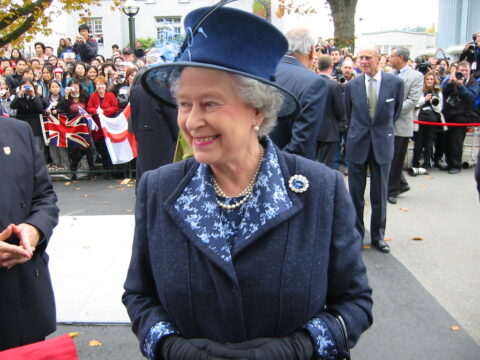
“Her Majesty Queen Elizabeth II” by Tinker Sailor Soldier Spy is licensed under CC BY-NC-ND 2.0 .
After a record-breaking reign of 70 years Her Majesty Queen Elizabeth died on Sept. 8, 2022.
She was the longest-ruling British monarch, outpacing her great-great-grandmother, Queen Victoria. However, Louis XIV of France still holds the absolute record, with 72 years, 100 days.
For most Canadians, the 96-year-old is the only sovereign they have ever known, but whether the country will sustain the connection after her death remains to be seen.
Certainly, Canada was the country she chose to visit most often. She was also here at one of the pivotal moments in our history when then-prime minister Pierre Elliott Trudeau brought home the Constitution in 1982. As sovereign, she signed the document in a rain-spattered and windy ceremony on Parliament Hill in Ottawa, the capital chosen by Queen Victoria.
But her connection to Canada had begun decades earlier. In 1939, Princess Elizabeth was reportedly the first British royal to make a transatlantic phone call: the recipients were her parents, then the Duke and Duchess of York, who were on a North American tour.
In 1951, the princess spent almost five weeks in Canada, filling in for her ailing father, George VI.
Winston Churchill, then in opposition, had wanted the princess and her husband, Prince Philip, the Duke of Edinburgh, to travel by boat, arguing air travel was unsafe.
But he was overruled and the royal couple became the first to embark on such a tour by air. With an action-packed schedule, they crossed the country from the Atlantic to the Pacific, including a side trip to Washington, D.C., greeted all the way by rapturous crowds. The royal pair square-danced, attended a hockey game and accepted countless bouquets.
August 21, 2022
David McCullough, RIP
In the latest SHuSH newsletter, Kenneth Whyte remembers the late David McCullough:
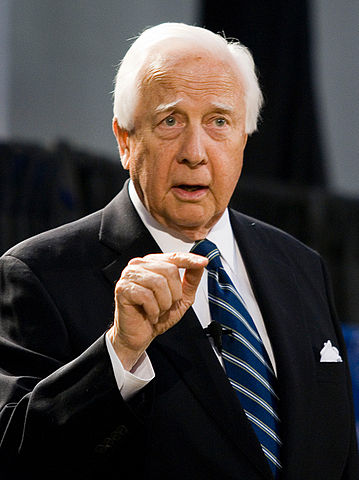
David McCullough speaking at Emory University, 25 April, 2007.
Photo by Brett Weinstein via Wikimedia Commons.
David McCullough died August 7 at the age of 89. He won Pulitzer Prizes for his biographies of John Adams and Harry Truman, National Book Awards for The Path Between the Seas, about the building of the Panama Canal, and Mornings on Horseback, a biography of young Theodore Roosevelt, as well as two Francis Parkman prizes (The Path, Truman) and the Presidential Medal of Freedom. He also enjoyed a prominent career as a broadcaster and several of his books were transformed into important television events, most notably HBO’s John Adams.
I read him closely over the years. Studied him, even. After finishing his major biographies — books that can’t fail to impress for their prodigious research and literary grace — I went back to his early work to trace how long it took him to develop into a master of narrative historical writing. I started at the beginning, The Johnstown Flood (1968), and was stunned to find that he was all there from page one. He had total command of his material and his story at the outset.
I wouldn’t call him a favorite writer. McCullough tended to play safe. He had a somewhat rosy view of American history: “I want to bring to life the best that can be found in the story of why we are the way we are and how we got to where we are.” He was so busy bringing the best to life that he seldom challenged his readers with the worst: truly repellant individuals or unredeemed national failure.
His subjects tended to be public-spirited men of noble character and hard-earned wisdom. He felt comfortable in their company. “It’s like picking a roommate,” he once said, explaining why he dropped the idea of a biography of Pablo Picasso. “After all, you’re going to be with that person every day, maybe for years, and why subject yourself to someone you have no respect for or outright don’t like?”
When the abhorrent forced its way into his stories, he tended to rationalize it. His formulation that Harry Truman’s decision to drop atomic bombs on Japan, killing hundreds of thousands of civilians, was a lesser evil necessary to prevent a greater evil (heavy American troop losses) may have got it exactly backward.
His paeans to American greatness even wore on American audiences in his later years. Reviews of The Pioneers, his 2019 account of the Euro-American settlement of the Ohio River valley, accused him of “romanticizing white settlement and downplaying the pain inflicted on Native Americans.”
I raise these issues not to speak ill of the dead but to say that McCullough is worth reading, and reading again, even if, like me, you’re part of the minority who can find him hard to take at times. (The majority love him: I’m not sure any historian has sold more books.)
I had the pleasure of meeting David McCullough in Toronto at an intimate lunch arranged by his publisher, Simon & Schuster. I interviewed him later for Macleans. He was a complete gentleman and an enjoyable companion, notwithstanding his many twice- and thrice-told stories (an occupational hazard for touring writers).
I was able to draw him out on various aspects of non-fiction craft, which he spoke well on. What follows are some of my favorite quotes from the interview along with several other things McCullough said about writing and one comment by another author, the great Candace Millard, about his work.
February 17, 2022
P.J. O’Rourke’s Holidays in Hell
Arthur Chrenkoff remembers the first of P.J. O’Rourke’s books he discovered in Australia after his family emigrated from Poland:
I haven’t heard of this O’Rourke fellow, but Holidays in Hell is a great title. I’ve always enjoyed reading about other countries, and the concept of travelling to war zones and other shitholes seems like a fertile territory for satire. Plus, as I see in the table of contents, O’Rourke had travelled to Poland a year before my family had left it. We were roughly in the same place at the same time. Now I just have to find out what this zany American thought of my homeland. I’m sold. So is the book.
It was a 50 cents well spent. I have the book next to my keyboard as I’m typing these words. It’s the first British edition, printed in in 1989 by Picador, so it would have been four or five years old when I bought it. It doesn’t look like it has aged at all since then. Maybe the paper is a tad more yellow but that’s about it. “What do they do for fun in Warsaw” is on page 83 (in the table of contents, the city is misspelled “Warshaw”, which actually makes it closer to the original Warszawa, the English “sh” being the same as the Polish “sz” sound – don’t say you didn’t learn anything new today). It was glorious, capturing with all of O’Rourke’s sardonic majesty the death rattles of the system that would collapse only three years later (not that any of us foresaw it). “I didn’t see any Evil Empire,” wrote P J, “that would have been too interesting. Communism doesn’t really starve or execute that many people. Mostly it just bores them to death”.
I enjoyed the rest of the book too, from civil war-torn Lebanon to divided Central America – the rightist El Salvador and the commie Nicaragua. Over the next few years I feasted on Republican Party Reptile. Parliament of Whores and Give War a Chance. I even managed to get to O’Rourke’s original non-political writing, Modern Manners and The Bachelor Home Companion, which I found just as funny if also less depressing than politics. Then I read all the new books as they came out. While it’s impolite to speak ill of the dead, I have found P J O’Rourke after 2000 increasingly struggling to be funny. His last output over the past six or so years as this “Republican Party reptile” and arch-libertarian ended up voting for Hillary Clinton because he didn’t like Donald Trump was cringeworthy and sad to read, which is did less and less of, until I did none at all. But it doesn’t change the fact that when P J was good – in the 1980s and 90s – he was a god. There was no one and nothing like him. He singlehandedly made right-of-centre sensibilities hip and the left ridiculous, which is the best weapon against those who fancy themselves too much.
At this point in time I should probably apologise for lying – P J O’Rourke did not save my life, though that sounded a lot sexier than any other title I could think of. What P J had done for me, however, was just as important: he set me on the right path.
The line from growing up in communist Poland forty years ago to The Daily Chrenk today might seem pretty straightforward in hindsight, but for a while in the early 1990s it got somewhat twisted and crooked, as lines tend to do when you attend university. Not only was I suddenly exposed in my Arts degree (majoring in Government, or political science, with a minor in History) to 50 Shades of Left, but I had embarked on wide-ranging reading spree of my own (nothing wrong with that; I still do), involving writers and topics as diverse as Noam Chomsky, the JFK assassination conspiracy theories, Robert Anton Wilson and Edmund Burke. Being a late developer, I went through the teenage phase of hating everyone and everything while in my early 20s. I was alone and homeless; not really angry but cynical and disenchanted.
At Samizdata, Johnathan Pearce also regrets O’Rourke’s death:
I met Mr O’Rourke about a decade ago, in what was the aftermath of the 2008 financial smash. He was charming company (my wife was bowled over by him – you have to watch these silver-tongued Irishmen) and retained the fizz that I recall from his coruscating book, Republican Party Reptile. I read that, I think, in around 1989, and then got my hands on anything he wrote. When he became a traveling correspondent for Rolling Stone magazine (a fact that today strikes one as impossible, such is the tribalism of our culture), I followed his columns closely. Parliament of Whores, written in the early 1990s and on the cusp of the Bill Clinton decade, stands the test of time as a brilliantly funny takedown of Big Government. Then came classics such as Eat The Rich and All The Trouble In The World.
I don’t quite think he kept the standard of searing wit + commentary at that level into the later 90s and into the current century. He did “serious stuff” with an amusing turn, such as a fine book about Adam Smith […] and could turn on the brilliance, but I think some of the energy had fallen off. He was a Dad with all the responsibilities that brings, and younger and less funny and more aggressive voices began to dominate the noise level in the public square. (Or maybe that is a sign that I am getting old, ahem.) O’Rourke, to the anger of some, wasn’t a Trump fan, and said so. He moved quite more explicitly libertarian, having a gig at the CATO Institute think tank. By his early 70s, I did not read or hear much of his doings, and that was a shame in the age of Greta, Cancel Culture, “Save the NHS”, Great Resets, Chinese nastiness and the Keto Diet. (I am kidding slightly about the last point.)
P J O’Rourke’s death saddens me as much as did that of two other fine men whom I met over the years and who died from cancer over the past couple of years: Brian Micklethwait and Sir Roger Scruton. They were all very different men, but they shared a common love of liberty, a mischievous wit and a hatred of cant.
I think the first of his books I ever read was Republican Party Reptile, and my copy got a bit dog-eared from being lent out to many friends and acquaintances over the next few years. As I understand it, O’Rourke had children late in life, and it may have been one of the reasons that some of the character and energy of his earlier works are somewhat lacking in writings from the last fifteen years or so … there are few activities that can absorb energy like caring for young children (I love seeing my grand-nieces when they visit, but I’m totally knackered by the time we’re waving goodbye).
January 12, 2022
“You feel instantly at home when you arrive in Kenya because Kenya was once everyone’s home!”
When I was in middle school, my favourite teacher was a huge fan of the Leakey family’s discoveries in central Africa, and took every opportunity to show us films on the latest hominid remains uncovered (and by “latest”, it usually meant several years old, as 16mm films distributed through the county school system were rarely all that “new”). I assume she was a frustrated anthropologist herself, honestly, although I found her to be a very good teacher even if she’d “settled” for teaching as a career. In The Iconoclast, Geoffrey Clarfield remembers the late Richard Leakey, “the last Victorian scientist”, who died earlier this month in Kenya:
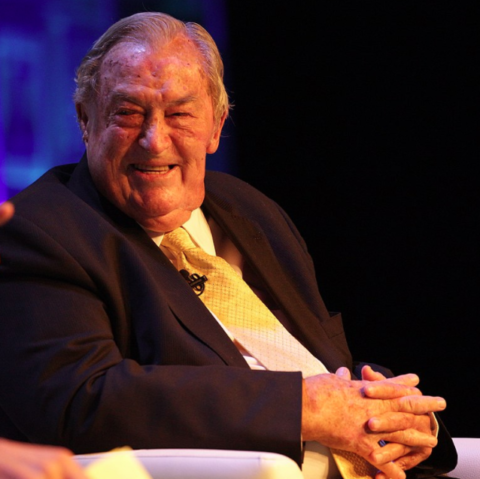
Richard Leakey at the WTTC Global Summit 2015.
Detail of original photo by the World Travel & Tourism Council via Wikimedia Commons.
Kenyan paleoanthropologist Richard Leakey died on January 2nd at age 77, following an extraordinary career devoted to the scientific exploration of human origins. Richard was once my boss. And although we never became friends, I came to know him fairly well.
He died peacefully in his house overlooking Kenya’s Great Rift Valley, where he’d made his most notable discoveries, and which occupied his imagination from an early age until his final days. It was fitting that he was buried beside his home, amid the same terrain from which he’d dug up humanity’s long-buried early ancestors. As I once heard him say to a group of visitors, “You feel instantly at home when you arrive in Kenya because Kenya was once everyone’s home!” (Essayists are supposed to shun exclamation marks, but this was simply the way the man spoke.)
To an outsider, Richard’s work history may appear to comprise a series of disconnected, sometimes testosterone-driven adventures. By turns, he was a wildlife trapper and animal trader, safari guide, bush pilot, gifted (albeit informally trained) fossil hunter, archaeological excavator, scientific autodidact, museum and civil-service administrator, member of parliament, opposition leader, cabinet minister, conservation activist, Kenyan patriot, fundraiser, public speaker, and prolific writer. The public knew him best as a television and film presenter. But those who knew him privately will also remember him as an enthusiastic team leader and mentor of young talent.
In my case, he helped advance my own project to train young Kenyan researchers to record and document traditional music in the northern part of their country, the Turkana District in particular. When I’d raised funds for this initiative, he brought it under the auspices of the National Museums of Kenya (NMK), of which he was then director.
While he may have seemed like something of an (enormously) overachieving dilettante to some, there was in fact a unity to his life and work. The times being what they are, many will focus on the fact that he was a white man taking a prominent role in a largely black country. But in truth, he likely attracted more scrutiny for being a fervent admirer of Charles Darwin, and a secular atheist, in a religious part of the world. He once published his own edited and illustrated version of Origin of Species, which I read when I was working for him, and his contributions to that volume gave me insight into what I believe was his fundamentally edifying professional motivation. I still have it on my shelf.
Richard emphasized that humankind had evolved in the Great Rift Valley, and from there had spread “out of Africa”, as the saying goes. He also believed that a previously underestimated factor in human evolution had been our species’ relationship to evolving biodiversity and prehistoric climate fluctuation — “paleoenvironments” as they came to be called.

